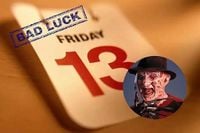Friday the 13th is often viewed as a day shrouded in superstition and bad luck, and in 2025, it falls just once—on June 13. This single occurrence stands in contrast to some years that host up to three Friday the 13ths, making 2025 a relatively mild year for those wary of this ominous date.
The reason behind this solitary Friday the 13th lies in the structure of the calendar itself. According to EarthSky, 2025 is a common year with 365 days, starting on a Wednesday. This specific alignment means only one month—June—begins on a Sunday, which is a key factor because any month starting on a Sunday will have a Friday the 13th. June 1, 2025, was indeed a Sunday, setting the stage for Friday the 13th to fall on June 13.
Interestingly, this calendar pattern last appeared in 2014, and after 2025, it won’t reoccur until 2031. These patterns emerge because the days of the week realign with calendar dates in predictable cycles, influenced by leap years and the Gregorian calendar's quirks. For instance, the Friday the 13th in June for common years starting on a Wednesday will recur in 6, 17, and 28-year intervals, with future dates including June 13, 2031; June 13, 2042; and June 13, 2053.
While 2025 has only one Friday the 13th, history shows that a year can have up to three. The last time three Friday the 13ths occurred was in 2015, specifically in February, March, and November. This will happen again in 2026, marking a rare calendar phenomenon. Two Friday the 13ths occurred in 2024, in September and December, and will happen again in 2029 with April and July hosting the dates.
But why does Friday the 13th carry such a notorious reputation? The superstition is mainly rooted in Western culture, with origins that are somewhat murky but likely tied to Christian traditions. According to National Geographic and other sources, one influential story comes from the Bible’s Last Supper, where Judas Iscariot was the 13th guest and is said to have betrayed Jesus. Jesus was then crucified the following day, which was a Friday. This combination of the number 13 and the day Friday has long been associated with misfortune.
This dual association is so powerful that it even has its own term: paraskevidekatriaphobia, the fear of Friday the 13th. The fear of the number 13 itself is called triskaidekaphobia. Some experts suggest that 13 is considered unlucky because 12 is seen as a complete or perfect number—there are 12 months in a year, 12 zodiac signs, 12 hours on a clock, and so forth. Anything beyond that, like 13, is viewed as irregular or unlucky.
Historical figures have even acted on these superstitions. President Franklin D. Roosevelt reportedly refused to travel on the 13th of any month and avoided hosting 13 guests at dinner parties. The hospitality industry also reflects this unease, with many hotels skipping the 13th floor entirely. According to Otis Elevator Company, up to 85% of elevator panels omit the number 13, a testament to how ingrained this superstition remains.
Globally, superstitions about unlucky dates vary. In Spain, for example, Tuesday the 13th—not Friday—is considered a day of bad luck, tied to ancient Greek and Roman myths. In Italy, the 17th day of the month is feared because the Roman numeral XVII can be rearranged to spell “my life is over” in Latin.
Friday the 13th has permeated popular culture as well. The 1980s slasher film franchise “Friday the 13th” cemented the date’s eerie reputation in the public imagination. Yet, not all associations with the day are grim. Many businesses have embraced it as an opportunity for marketing and fun. For instance, Krispy Kreme offered a dozen Original Glazed doughnuts for just 13 cents with the purchase of another item on June 13, 2025. Chipotle celebrated with a buy-one-get-one-free promotion for customers sporting tattoos, even handing out temporary tattoos at select locations.
Despite the superstition, some notable figures embrace the number 13. Global pop star Taylor Swift, born on December 13, famously considers it her lucky number, though her birthday won’t fall on a Friday again until 2041. Moreover, in 2023, a single winner hit the jackpot in the January 13 Mega Millions drawing, claiming a $1.35 billion prize. The Mega Millions drawing for June 13, 2025, was estimated at $264 million, adding a hint of excitement to the date.
Superstitions tied to Friday the 13th include avoiding breaking mirrors, steering clear of black cats crossing one’s path, not walking under ladders, and being cautious about spilling salt or stepping on cracks. These beliefs have been passed down through generations, often serving as rituals to ward off bad luck.
Anthropologist Dr. Phil Stevens explains that Friday the 13th represents a “double whammy” of taboos: the fear of the number 13 and the negative connotations of Friday, largely due to its biblical associations. He describes the belief as “magical thinking,” where people perceive a causal relationship between unrelated events. Stevens also points out that the superstition is more of a “taboo” — an avoidance of establishing potentially harmful connections — than a mere superstition, highlighting the complexity of human beliefs.
Historically, tragic events have coincided with Friday the 13th, reinforcing its ominous reputation. Noteworthy examples include the 1972 crash of a Uruguayan plane carrying a rugby team in the Andes, the 2012 sinking of the Costa Concordia cruise ship resulting in 32 deaths, and the infamous serial killer Jack the Ripper claiming his final victim on a Friday the 13th in 1888. The stock market’s sudden drop on “Black Friday,” October 13, 1989, also added to the lore surrounding the date.
Looking ahead, the calendar will continue to play its part in the cycle of Friday the 13ths. Leap years starting on a Tuesday, such as in 2036, also feature a solitary Friday the 13th in June. These leap year occurrences repeat every 28 years within a century, with the next expected in 2064. However, the Gregorian calendar’s rules, which differ from the Julian calendar, cause slight perturbations in these cycles, especially around century years like 2100.
In sum, while Friday the 13th in 2025 may bring some jitters to the superstitious, it is but a single day in a complex dance of calendar cycles and cultural beliefs. Whether viewed as an unlucky day, a fun marketing opportunity, or just another Friday, it remains a fascinating blend of history, myth, and human psychology.



